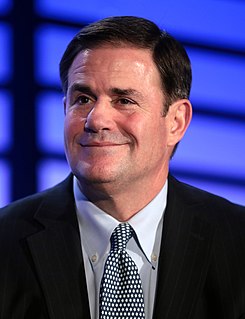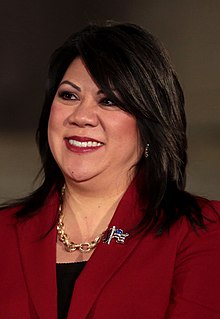
Arizona's 8th congressional district is a congressional district located in the U.S. state of Arizona. It includes many of the suburbs north and west of Phoenix, in Maricopa County, Arizona.

The 2008 congressional elections in Arizona were held on November 4, 2008, to determine who would represent the state of Arizona in the United States House of Representatives, coinciding with the presidential election. Representatives are elected for two-year terms; those elected would serve in the 111th Congress from January 4, 2009, until January 3, 2011.

Steve Montenegro is a Salvadoran-American Republican politician from Litchfield Park, Arizona who is a former member of the Arizona Senate. He was previously a member of the Arizona House of Representatives, where he was Speaker Pro Tempore.

The 2012 United States House of Representatives elections in Arizona were held on Tuesday, November 6, 2012, to elect the nine U.S. Representatives from the state, one from each of the state's nine Congressional districts, including the newly created 9th district following the 2010 United States Census. The elections coincided with other federal and state elections, including a quadrennial presidential election, and a U.S. Senate election. Primary elections were held on August 28, 2012.

A 2012 special election in Arizona's 8th congressional district was held on June 12, with primary elections held on April 17, to fill a seat in the United States House of Representatives for Arizona's 8th congressional district until the 112th United States Congress ends on January 3, 2013. The election was caused by the resignation of Representative Gabrielle Giffords on January 25, 2012, to concentrate on recovering from her injuries from the 2011 Tucson shooting. The seat was won by Ron Barber, a former aide to Giffords who was wounded in the attempt on her life.

The 2014 Arizona gubernatorial election was held on November 4, 2014, to elect the Governor of Arizona, concurrently with elections to the United States Senate in other states and elections to the United States House of Representatives and various state and local elections.

The 2014 United States House of Representatives elections in Arizona were held on Tuesday, November 4, 2014 to elect the nine U.S. Representatives from the state of Arizona, one from each of the state's nine congressional districts, with Democratic and Republican primaries taking place on August 26. The elections coincided with the elections of other federal and state offices, including Governor of Arizona.
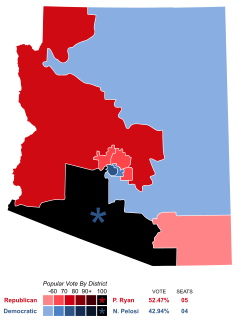
The 2016 United States House of Representatives elections in Arizona were held on November 8, 2016, to elect the nine U.S. Representatives from the state of Arizona, one from each of the state's nine congressional districts. The elections coincided with the 2016 U.S. presidential election, as well as other elections to the House of Representatives, elections to the United States Senate and various state and local elections. The primaries were held on August 30.

The 2018 United States Senate election in Arizona took place on November 6, 2018, to elect a member of the United States Senate to represent the State of Arizona and replace Senator Jeff Flake, who did not run for re-election. It was held concurrently with other elections to the United States Senate, elections to the United States House of Representatives, and various state and local elections.

A general election was held in the U.S. state of Arizona on November 6, 2018. All of Arizona's executive offices were up for election as well as a United States Senate seat and all of Arizona's nine seats in the United States House of Representatives. The Democratic Party picked up three statewide offices, as well as a seat in the U.S. House.

The 2018 United States House of Representatives elections in Ohio were held on November 6, 2018, to elect the 16 U.S. Representatives from the U.S. state of Ohio, one from each of the state's 16 congressional districts. The elections coincided with other elections to the House of Representatives, elections to the United States Senate and various state and local elections.
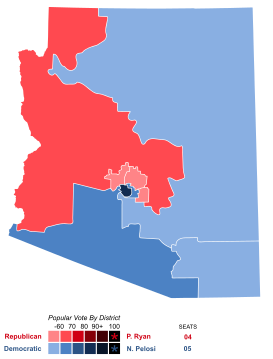
The 2018 United States House of Representatives elections in Arizona were held on November 6, 2018, to elect the nine U.S. Representatives from the state of Arizona, one from each of the state's nine congressional districts. The elections coincided with the 2018 Arizona gubernatorial election, as well as other elections to the House of Representatives, elections to the United States Senate and various state and local elections. The 2018 general elections saw the Democratic party gain the 2nd Congressional district, thus flipping the state from a 5–4 Republican advantage to a 5–4 Democratic advantage, the first time since the 2012 election in which Democrats held more House seats in Arizona than the Republicans.

The 2018 United States House of Representatives elections in California were held on November 6, 2018, with the primary elections being held on June 5, 2018. Voters elected the 53 U.S. Representatives from the state of California, one from each of the state's 53 congressional districts. The elections coincided with the elections of other offices, including a gubernatorial election, other elections to the House of Representatives, elections to the United States Senate, and various state and local elections. Democrats won in 7 congressional districts previously represented by Republicans, all of which voted for Hillary Clinton in 2016. This reduced the California House Republican delegation by half and left the Republican Party with the fewest seats in California since 1946.

The 2018 United States House of Representatives elections in Massachusetts were held on November 6, 2018, electing the nine U.S. Representatives from the Commonwealth of Massachusetts, one from each of the state's nine congressional districts. The elections coincided with the gubernatorial election, as well as other elections to the House of Representatives, elections to the United States Senate and various state and local elections. The primary election for contested nominations was held on September 4, 2018.

The 2018 United States House of Representatives elections in Minnesota were held on November 6, 2018, to elect the eight U.S. Representatives from the state of Minnesota, one from each of the state's eight congressional districts. The elections coincided with an open gubernatorial election, a U.S. Senate election, a special U.S. Senate election, State House elections, and other elections.

The 2018 United States House of Representatives elections in Wisconsin were held on November 6, 2018, to elect the eight U.S. Representatives from the state of Wisconsin, one from each of the state's eight congressional districts. The elections coincided with other elections to the House of Representatives, elections to the United States Senate and various state and local elections. The Wisconsin Partisan Primary was held on August 14, 2018, with the governor, U.S. Senator, U.S. Representative, odd-numbered Wisconsin State Senate seats, and all Wisconsin Assembly seats on the ballot.
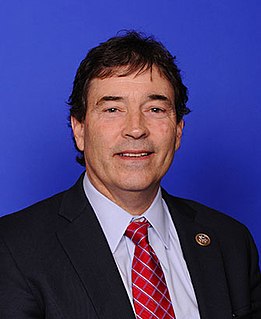
A special election for Ohio's 12th congressional district was held August 7, 2018, following the resignation of Republican U.S. Representative Pat Tiberi. The Republican Party nominated State Senator Troy Balderson for the seat while the Democratic Party nominated Franklin County Recorder Danny O'Connor. Balderson led O'Connor in preliminary results, however the race was not officially called on election night. Counting of outstanding ballots began on August 18 and was completed on August 24. The outstanding ballots did not change the margin enough to trigger an automatic recount, so Balderson was declared the winner on August 24.

The 2020 United States House of Representatives elections in Arizona will be held on November 3, 2020, to elect the nine U.S. Representatives from the state of Arizona, one from each of the state's nine congressional districts. The elections will coincide with the 2020 U.S. presidential election, as well as other elections to the House of Representatives, elections to the United States Senate and various state and local elections.


